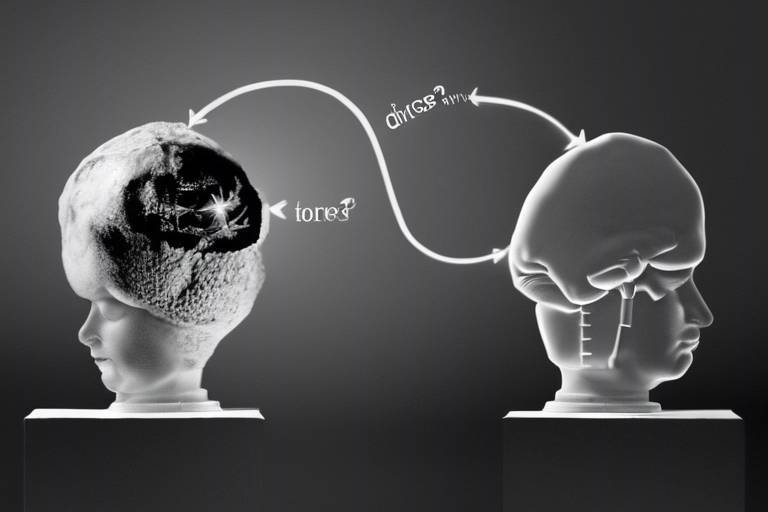The Impact of Einstein’s Relativity on Philosophy
Einstein's theory of relativity isn't just a groundbreaking scientific achievement; it has also profoundly influenced the realm of philosophy. This revolutionary theory has reshaped our understanding of fundamental concepts such as time, space, and reality, challenging long-held beliefs that have persisted for centuries. Imagine standing on a street corner, watching the world rush by, and realizing that your perception of time and space is not as fixed as you once thought. This is the essence of relativity—it invites us to reconsider our perspectives and opens up a treasure trove of philosophical inquiry.
As we delve deeper into the impact of relativity, we find ourselves navigating through a landscape where traditional metaphysical concepts are not just questioned but often turned on their heads. The very nature of existence, the fabric of reality, and the intricate relationship between time and space have become hot topics of discussion among philosophers. It's as if Einstein handed us a new pair of glasses, allowing us to see the world in a way we never imagined possible. This shift has sparked debates that challenge the status quo, pushing the boundaries of what we think we know.
Moreover, Einstein's insights have significant epistemological repercussions. They raise profound questions about how we acquire knowledge and perceive reality. Are there absolute truths, or do our understandings shift based on our context? Just as Einstein suggested that time can stretch and warp, so too can our grasp of truth. This leads us to explore the concept of relative truths in philosophy, where the context of the observer plays a pivotal role in shaping what is considered knowledge.
In this new philosophical landscape, the tension between contextualism and absolutism has intensified. Contextualism posits that our understanding of truth is deeply influenced by the circumstances in which we find ourselves, while absolutism clings to the idea that there are universal truths that apply regardless of context. This ongoing dialogue invites us to reflect on how our perceptions and experiences shape our understanding of knowledge and truth—much like how Einstein's theories encourage us to rethink the very fabric of reality.
Furthermore, the implications of relativity extend into the realm of scientific realism. Einstein's work challenges the notion that scientific theories are mere reflections of reality. Instead, it prompts a reevaluation of the relationship between scientific models and the truths they aim to describe. This ongoing debate in the philosophy of science continues to evolve, as thinkers grapple with the implications of a universe where reality may not be as straightforward as once believed.
In conclusion, the impact of Einstein's relativity on philosophy is nothing short of transformative. It has opened up new avenues of thought, challenging us to reconsider our understanding of time, space, and truth. As we navigate this philosophical terrain, we find ourselves not just as passive observers, but as active participants in a dialogue that shapes our understanding of existence itself. The questions raised by relativity are not just academic; they resonate deeply within our everyday lives, compelling us to reflect on our place in the cosmos and the nature of reality.
- What is Einstein's theory of relativity? - Einstein's theory of relativity consists of two parts: special relativity and general relativity, which describe how time and space are interconnected and how they are affected by gravity.
- How has relativity influenced philosophy? - Relativity has prompted philosophers to rethink concepts of time, space, and truth, leading to debates about the nature of reality and knowledge.
- What are relative truths? - Relative truths are perspectives that suggest that what we perceive as truth can vary based on context and individual experience.
- What is the difference between contextualism and absolutism? - Contextualism argues that truth is shaped by context, while absolutism asserts that some truths are universal and unchanging.
- How does relativity affect our understanding of ethics? - Relativity introduces the idea of moral relativism, suggesting that ethical judgments may vary based on individual perspectives and cultural contexts.

The Shift in Metaphysical Concepts
Einstein's theory of relativity has not only revolutionized physics but has also stirred the philosophical pot, prompting a significant shift in metaphysical concepts. Traditionally, metaphysics has grappled with questions about the nature of existence, reality, and the fundamental structure of the universe. However, with Einstein's insights, these long-standing views are being challenged. Imagine standing on a platform, watching a train rush by. To you, it seems to be moving at a specific speed, but to someone on the train, the world outside appears to rush in the opposite direction. This simple analogy encapsulates the core of relativity—perception plays a critical role in understanding reality.
Philosophers are now engaging in lively debates about the nature of existence itself. Is reality a static entity, or is it more like a flowing river, constantly shaped by the movement of observers? This question leads us to ponder the very fabric of reality, which Einstein's theory suggests is intertwined with time and space. The once-clear boundaries between these concepts are now blurred, prompting a re-evaluation of what we mean when we speak of existence.
In this new philosophical landscape, the relationship between time and space is no longer linear or independent. Instead, they are seen as a unified entity—space-time. This realization has profound implications for metaphysics, leading to a reconsideration of how we define existence. For example, if time is relative, does that mean our experiences and memories are also subject to the same relativistic principles? The implications are staggering.
To illustrate this shift, consider the following table that contrasts traditional metaphysical views with those influenced by Einstein's relativity:
| Traditional Metaphysics | Metaphysics Post-Relativity |
|---|---|
| Existence is absolute and unchanging. | Existence is relative and influenced by perspective. |
| Time is linear and independent of space. | Time and space are interconnected in a dynamic fabric. |
| Truths are universal and unchanging. | Truths are contextual and can vary based on observation. |
This table highlights how relativity has prompted a rethinking of fundamental concepts within metaphysics. As philosophers grapple with these new ideas, they find themselves questioning the very essence of reality, existence, and truth. The shift has led to a rich tapestry of discussions, where the implications of relativity extend beyond the realm of physics and into the core of philosophical inquiry.
In conclusion, the impact of Einstein's relativity on metaphysical concepts is profound and far-reaching. As we continue to explore these ideas, we are reminded that our understanding of reality is not fixed; it is a living, breathing entity that evolves with our perceptions and insights. Just as the train and the platform observer see different realities, our philosophical inquiries may lead us down various paths, each revealing a unique facet of existence.

Epistemological Repercussions
Einstein's theory of relativity has not only revolutionized the field of physics but has also sparked a seismic shift in the realm of philosophy, particularly in epistemology—the study of knowledge and understanding. This groundbreaking theory raises profound questions about how we perceive reality, challenging the notion of absolute truths that have long been the cornerstone of philosophical inquiry. Imagine standing on a train, racing through the landscape; your perception of time and distance shifts dramatically depending on your vantage point. This analogy encapsulates the essence of relativity and its impact on our understanding of knowledge.
The implications of relativity compel us to reconsider the very foundations of what we deem as knowledge. Traditional epistemology often hinges on the idea that there are universal truths that apply to all observers, regardless of context. However, Einstein's work suggests that our understanding of reality is inherently tied to our perspective. This leads to an exploration of relativistic perspectives, where knowledge is not a fixed entity but rather a fluid concept shaped by various factors including time, space, and the observer's position.
As we delve into these epistemological repercussions, we encounter the idea of relative truths. Philosophers are increasingly acknowledging that what we consider to be "truth" may vary significantly based on the context in which it is perceived. For instance, two observers in different frames of reference might witness the same event but interpret it through vastly different lenses, leading to divergent conclusions about its significance. This phenomenon mirrors the relativistic understanding of time and space, where the observer plays a crucial role in shaping their reality.
Furthermore, the tension between contextualism and absolutism has been heightened by the advent of relativity. Contextualism posits that knowledge and truth are influenced by the specifics of a situation, while absolutism holds that there are fixed truths that apply universally. The debates surrounding these two perspectives have intensified, as philosophers grapple with the implications of relativity on our understanding of knowledge. Are we to accept that knowledge is inherently subjective, or can we still find a way to anchor it in something more stable?
Another critical area affected by the theory of relativity is the realm of scientific realism. This philosophical position asserts that scientific theories aim to accurately describe an objective reality. However, Einstein's relativity invites skepticism about this claim, as it challenges the notion that scientific theories can provide a definitive account of reality. Instead, it fosters ongoing debates in the philosophy of science, prompting a reevaluation of how we relate scientific theories to the world they seek to explain.
In summary, the epistemological repercussions of Einstein's theory of relativity are profound and far-reaching. They compel us to reconsider our understanding of knowledge, truth, and reality itself. As we navigate this complex landscape, it becomes increasingly clear that our perceptions are shaped by the context in which we find ourselves, leading to a richer, albeit more complicated, understanding of the world around us.
- What is epistemology?
Epistemology is the branch of philosophy concerned with the nature and scope of knowledge, including the methods, validity, and limits of what we can know. - How does Einstein's relativity challenge traditional views of knowledge?
Einstein's relativity suggests that knowledge is not absolute but influenced by the observer's perspective, leading to a more contextual understanding of truth. - What are relative truths?
Relative truths are concepts that can vary depending on the context in which they are perceived, contrasting with the idea of universal truths that apply to all observers. - What is the difference between contextualism and absolutism?
Contextualism posits that knowledge is shaped by specific contexts, while absolutism holds that there are fixed truths that are universally applicable.

Relative Truths in Philosophy
In the wake of Einstein's groundbreaking theory of relativity, philosophers have found themselves grappling with the concept of relative truths. This shift has been nothing short of revolutionary, as it challenges the long-held belief that truths are universal and absolute. Instead, it posits that our understanding of truth is heavily influenced by our individual perspectives and contexts. Imagine standing on a busy street corner; your view of the world is shaped by your location, the people around you, and even the time of day. Just as your perception of the street is unique to you, so too is your understanding of truth.
This philosophical transformation encourages a deeper exploration of how context shapes our beliefs and knowledge. For example, consider how different cultures interpret the concept of justice. In one society, justice may be viewed as strict retribution, while in another, it could be seen as restorative and focused on healing. These differing interpretations illustrate how truths can vary dramatically based on cultural, historical, and situational factors.
Furthermore, this notion of relative truths prompts us to examine the implications for how we communicate and engage with one another. If we accept that our truths are influenced by our unique experiences, then dialogue becomes essential. Engaging in conversations with others allows us to expand our understanding and challenge our preconceived notions. It's like piecing together a puzzle; each person's perspective adds a new piece that contributes to a more comprehensive picture of reality.
| Contextual Factors | Influence on Truth |
|---|---|
| Cultural Background | Shapes moral and ethical beliefs |
| Personal Experiences | Influences perceptions of reality |
| Historical Context | Affects interpretations of events |
| Social Environment | Guides collective understanding |
As we delve deeper into this philosophical landscape, the questions arise: What does it mean to know something? and How do we ascertain the validity of our beliefs? These inquiries highlight the importance of perspective in shaping our understanding of truth. Just as Einstein's theory of relativity revolutionized our understanding of time and space, the exploration of relative truths in philosophy invites us to reconsider the very foundations of knowledge itself.
In conclusion, the embrace of relative truths encourages a more nuanced and empathetic approach to philosophical discourse. By acknowledging that our truths are not absolute but rather shaped by our contexts, we open the door to richer conversations and a deeper understanding of the complexities of human experience. It's a reminder that, much like the universe itself, our understanding of truth is ever-expanding and constantly evolving.
- What are relative truths in philosophy? Relative truths are beliefs or concepts that are influenced by individual perspectives and contexts, rather than being universally accepted as absolute.
- How does Einstein's theory of relativity relate to philosophy? Einstein's theory challenges traditional notions of absolute truths, prompting philosophers to reconsider how context affects knowledge and understanding.
- Why is dialogue important in discussing relative truths? Dialogue allows individuals to share their unique perspectives, enriching the understanding of truth and fostering empathy among differing viewpoints.

Contextualism vs. Absolutism
In the philosophical arena, the debate between contextualism and absolutism has gained significant traction, especially in light of Einstein's theory of relativity. At its core, this discussion revolves around whether truths are fixed and universal or whether they are influenced by the context in which they are situated. Imagine standing on a busy street corner, observing the world around you. Your perspective is shaped by your surroundings, experiences, and even your mood, leading you to interpret events in a way that is uniquely yours. This analogy beautifully encapsulates the essence of contextualism, which posits that knowledge and truth are inherently tied to specific situations.
On the other hand, absolutism argues for a more rigid framework where truths exist independently of individual perspectives. It suggests that there are universal truths that apply to all, regardless of context. This perspective can be likened to a mathematical formula that holds true no matter where or how it is applied. The tension between these two philosophical stances has been heightened by the implications of relativity, which challenges the notion of absolute truths in favor of a more nuanced understanding of reality.
To illustrate this dichotomy further, consider the following table that highlights key differences between contextualism and absolutism:
| Aspect | Contextualism | Absolutism |
|---|---|---|
| Definition | Truths are dependent on context and perspective. | Truths are fixed and universal, independent of context. |
| Example | Personal experiences shape understanding; what is true for one may not be true for another. | Mathematical truths apply universally; 2 + 2 4 is always true. |
| Philosophical Implications | Encourages a more flexible and pluralistic approach to knowledge. | Supports the idea of objective reality and universal standards. |
This ongoing dialogue raises important questions: How does one reconcile personal beliefs with the idea of universal truths? Can we ever truly understand a concept without considering the context in which it exists? The implications of this debate extend beyond philosophy, influencing fields such as science, ethics, and even politics. As we navigate through a world that is increasingly interconnected yet diverse in perspectives, the challenge lies in finding a balance between these two philosophical approaches.
Ultimately, the discussion of contextualism versus absolutism invites us to critically examine our own beliefs and the frameworks through which we interpret the world. It encourages a deeper understanding of how our perceptions shape our realities while also acknowledging the existence of broader truths that may transcend individual experiences. Just as Einstein's relativity has transformed our understanding of time and space, it has also prompted us to rethink the very foundations of knowledge and truth in philosophy.

Implications for Scientific Realism
Einstein's theory of relativity has not only reshaped our understanding of the universe but has also significantly challenged the foundations of scientific realism. At its core, scientific realism posits that the world described by science is real and exists independently of our perceptions or theories. However, the implications of relativity suggest a more complex relationship between our scientific theories and the nature of reality itself.
One of the most striking aspects of relativity is its insistence on the observer's role in the perception of time and space. This notion raises critical questions: If our understanding of reality is contingent upon the observer's frame of reference, can we truly claim that scientific theories provide an objective description of the world? The tension between the observer-dependent nature of reality and the idea of an objective, observer-independent world leads to profound implications for scientific realism.
To illustrate this concept, consider the following table that summarizes the contrasting views of scientific realism and the implications brought about by relativity:
| Aspect | Scientific Realism | Relativistic Perspective |
|---|---|---|
| Nature of Reality | Objective and independent | Observer-dependent and contextual |
| Truth | Absolute truths exist | Truths are relative |
| Scientific Theories | Accurate representations of reality | Models shaped by observer's context |
This table encapsulates the fundamental shift in thinking that arises from Einstein's work. As we dive deeper into the implications of relativity, we find ourselves questioning whether our scientific theories are mere models that help us navigate our experiences rather than definitive truths about the world. This realization invites a more philosophical approach to science, where theories become tools for understanding rather than absolute representations of reality.
Moreover, the challenges posed by relativity have led to a reevaluation of how we interpret scientific theories. Philosophers and scientists are increasingly recognizing that theories may be more about the framework we use to make sense of our observations rather than direct reflections of the underlying reality. This shift encourages a more dynamic understanding of science, where theories are seen as evolving constructs that adapt to new evidence and perspectives.
In summary, the implications of Einstein's relativity for scientific realism are profound and multifaceted. They compel us to reconsider the nature of truth, the role of the observer, and the very fabric of reality itself. As we continue to explore these ideas, we are reminded that the pursuit of knowledge is not just about uncovering facts but also about understanding the complex interplay between our perceptions, theories, and the universe we inhabit.
- What is scientific realism? Scientific realism is the belief that the world described by science is real and exists independently of our perceptions.
- How does relativity challenge scientific realism? Relativity suggests that our understanding of reality is observer-dependent, raising questions about the objectivity of scientific theories.
- What are the implications of observer-dependence? It implies that scientific theories may not be absolute truths but rather contextual models shaped by the observer's frame of reference.
- Can scientific theories evolve? Yes, scientific theories are often seen as dynamic constructs that adapt to new evidence and perspectives over time.

Philosophy of Time and Space
Einstein's revolutionary insights into the nature of time and space have sparked profound philosophical inquiries that challenge our traditional understandings. Before relativity, time was often viewed as a constant, a linear path that everyone experienced in the same way, much like a train traveling on a fixed track. However, Einstein introduced the concept that time is not merely a backdrop for events but is intricately woven into the fabric of the universe itself. This idea prompts us to ask: What if time is more like a river, flowing differently for each observer?
In the realm of philosophy, this shift has led to a reevaluation of how we perceive reality. The notion that time can dilate and contract based on speed and gravitational fields suggests that our experiences of time are subjective, influenced by our position and movement through space. Imagine two twins, one traveling in a spaceship at near-light speed while the other remains on Earth. Upon reunion, the traveling twin would be younger than the one who stayed behind. This thought experiment, known as the twin paradox, illustrates how relativity challenges our intuitive notions of time as a universal constant.
Moreover, the relationship between time and space raises questions about their independence. Are they separate entities, or are they intertwined in a way that blurs the lines between them? Philosophers have long debated the essence of space and time, leading to various schools of thought:
- Substantivalism: This perspective treats space and time as entities that exist independently of the objects they contain.
- Relationism: In contrast, relationists argue that space and time are merely the relationships between objects, with no independent existence.
As we delve deeper into these philosophical waters, we encounter the implications of Einstein's theories on our understanding of causality. If time is relative, can we still speak of cause and effect in absolute terms? The linear causality that we once took for granted becomes murky, inviting us to explore alternative frameworks of understanding. Some philosophers propose that causality might also be context-dependent, leading to a more relativistic view of how events are interconnected.
Furthermore, Einstein's theories have implications for our understanding of the universe itself. The cosmos is not merely a vast empty space; it is a dynamic entity where time and space are interdependent. This realization can evoke a sense of wonder and humility, prompting us to reflect on our place within the grand tapestry of existence. As we explore the universe, we may find ourselves grappling with existential questions: What does it mean to exist in a universe where time is not absolute?
In conclusion, the philosophy of time and space, influenced by Einstein's relativity, invites us to reconsider our fundamental beliefs about reality. It challenges us to embrace a more nuanced understanding of existence, where time is a fluid experience and space is an interconnected web of relationships. As we continue to explore these ideas, we may find that the answers to our questions are not as straightforward as we once believed, but rather a complex dance of perspectives that enrich our understanding of the universe.
- How does Einstein's theory of relativity change our understanding of time?
Einstein's theory suggests that time is not a fixed entity but can vary depending on speed and gravitational effects, making it a relative experience. - What is the twin paradox?
The twin paradox illustrates how time dilation affects two twins differently based on their relative speeds, leading to one being younger than the other upon reunion. - Are space and time independent of each other?
This is a matter of philosophical debate, with some arguing that they are separate entities (substantivalism) and others claiming they are interconnected (relationism). - What are the implications of relativity for causality?
Relativity challenges the notion of absolute causality, suggesting that cause and effect may also depend on the observer's frame of reference.

Ethical Considerations
When we dive into the realm of ethics, it's impossible to ignore the profound implications that Einstein's theory of relativity has on our moral frameworks. This isn't just a dry academic discussion; it's a vibrant conversation that reshapes how we perceive right and wrong in our lives. Imagine standing at the edge of a vast canyon, where the view changes dramatically depending on where you stand. This metaphor captures the essence of how relativity influences our ethical considerations. Just as different viewpoints can alter our perception of a landscape, they can also transform our understanding of moral truths.
Einstein's ideas challenge the notion of universal moral truths, suggesting instead that ethical principles may be more fluid, adapting to the context of individual experiences. This leads us to the concept of moral relativism, which posits that what is considered "right" or "wrong" can vary significantly based on cultural, social, and personal contexts. For instance, an action deemed acceptable in one culture may be viewed as unethical in another. This divergence raises important questions about the universality of ethics. Are we, as global citizens, capable of establishing a common moral ground, or are we forever bound to the subjective nature of our ethical beliefs?
Furthermore, the implications of relativity extend into our understanding of ethical responsibility. With the realization that our perceptions are influenced by our unique contexts, we must consider how this shapes our moral judgments. For example, if a person makes a decision based on their circumstances, should we judge them through the lens of our own experiences? This dilemma invites us to reflect on the nature of empathy and understanding in ethical discourse.
To illustrate this point, consider the following table that contrasts absolutist and relativist perspectives in ethics:
| Aspect | Absolutism | Relativism |
|---|---|---|
| Nature of Truth | Universal and unchanging | Context-dependent and variable |
| Judgment Criteria | Objective standards | Subjective experiences |
| Example | Stealing is always wrong | Stealing may be justified in desperate circumstances |
As we navigate this complex landscape, the question arises: how do we reconcile our ethical beliefs with the relativistic nature of our existence? This is where philosophical inquiry becomes crucial. It prompts us to engage in deep discussions about the foundations of our moral beliefs and the implications of our choices. Are we prepared to embrace a more nuanced understanding of ethics that acknowledges the diversity of human experience?
Moreover, the philosophical implications of relativity also touch on our responsibilities toward others and the environment. If we accept that our perspectives shape our ethical judgments, we must also recognize that our actions have consequences that extend beyond our immediate surroundings. This realization invites a broader contemplation of our role in the universe and the ethical responsibilities that come with it. In this light, the exploration of cosmological perspectives becomes intertwined with our moral considerations, urging us to reflect on how our understanding of the cosmos influences our ethical frameworks.
- What is moral relativism? Moral relativism is the belief that moral truths are not absolute but vary based on context, culture, and individual perspectives.
- How does Einstein's relativity influence ethics? Einstein's relativity encourages us to view ethical truths as context-dependent, challenging the notion of universal moral standards.
- Can we establish a common moral ground in a relativistic framework? While challenging, it is possible to seek common values and principles that can bridge diverse ethical perspectives.
- What role does empathy play in ethical judgments? Empathy allows us to understand the context of others' experiences, fostering a more compassionate approach to moral decision-making.

Moral Relativism
Moral relativism is a fascinating concept that has gained traction in philosophical discussions, particularly in light of Einstein's revolutionary ideas. At its core, moral relativism suggests that moral truths are not universal but are instead shaped by cultural, social, and contextual factors. This perspective challenges the traditional view that there are absolute moral standards applicable to all individuals, regardless of their backgrounds. Just as Einstein's theory of relativity transformed our understanding of space and time, moral relativism reshapes how we perceive ethics in a diverse and interconnected world.
Consider this: what is right or wrong can vary dramatically from one culture to another. For example, practices considered acceptable in one society may be viewed as immoral in another. This idea can be likened to how different observers might perceive the same event in distinct ways, depending on their position in space and time. In the same vein, moral judgments are often influenced by the observer's context, leading to a multitude of ethical interpretations. This raises significant questions: If morality is subjective, how do we navigate ethical dilemmas? What happens when our moral beliefs clash with those of others?
To illustrate this further, let's break down some key aspects of moral relativism:
- Cultural Influence: Different cultures have unique moral frameworks that dictate what is considered right or wrong. For instance, in some cultures, communal well-being may take precedence over individual rights, while in others, personal freedom is paramount.
- Contextual Factors: The context in which a moral decision is made plays a crucial role. Factors such as historical background, societal norms, and individual experiences can all influence moral judgments.
- Ethical Pluralism: Moral relativism embraces the idea that multiple moral perspectives can coexist. This pluralism acknowledges that there may be valid reasons for differing ethical beliefs, promoting dialogue and understanding.
As we delve deeper into moral relativism, we encounter the idea that our ethical frameworks are not only shaped by our cultural backgrounds but also by the changing dynamics of society. For example, issues like climate change and social justice challenge us to rethink our moral obligations in a global context. Are we responsible for the well-being of others, even if their moral beliefs differ from ours? This question highlights the potential for moral relativism to foster empathy and understanding across diverse perspectives.
However, the implications of moral relativism are not without controversy. Critics argue that if morality is entirely subjective, it could lead to moral nihilism—the belief that no action can be deemed right or wrong. This slippery slope raises concerns about the potential for justifying harmful behaviors under the guise of cultural differences. Thus, the challenge lies in finding a balance between respecting diverse moral viewpoints and upholding certain ethical standards that protect human dignity and rights.
In conclusion, moral relativism, much like Einstein's theory of relativity, invites us to reconsider our assumptions and embrace the complexity of human experience. It encourages a more nuanced understanding of ethics, one that acknowledges the diversity of moral perspectives while still striving for a common ground. As we navigate an increasingly interconnected world, the principles of moral relativism may provide a framework for fostering dialogue, compassion, and mutual respect among individuals with differing beliefs.
- What is moral relativism? Moral relativism is the belief that moral truths are not universal and are shaped by cultural, social, and contextual factors.
- How does moral relativism relate to Einstein's theory of relativity? Both concepts emphasize the importance of perspective and context, suggesting that what is considered true or right can vary based on individual circumstances.
- Are there any criticisms of moral relativism? Yes, critics argue that if morality is entirely subjective, it could lead to moral nihilism, where no actions can be deemed right or wrong.
- How can moral relativism foster understanding? By recognizing that multiple moral perspectives can coexist, moral relativism encourages dialogue and empathy among individuals with differing beliefs.

Cosmological Perspectives
When we delve into the influenced by Einstein's theory of relativity, we are not just exploring the vastness of the universe; we are also engaging in profound philosophical inquiries about our existence and significance within that universe. Einstein's insights have revolutionized how we perceive not only time and space but also our place in the grand scheme of things. Imagine standing on a tiny speck of dust, spinning in an infinite cosmos. It’s a humbling thought, isn't it?
As we grapple with the implications of relativity, we must confront the question: What does it mean to be human in an ever-expanding universe? The answers are as varied as the stars themselves. For instance, the concept of time dilation—where time can move differently depending on one's velocity—challenges our traditional understanding of a universal timeline. This leads us to ponder whether our experiences and memories are as linear as we once believed. Are our lives merely snapshots in a cosmic film that plays out differently at various speeds?
Moreover, the implications of relativity extend to our ethical responsibilities. If we accept that our understanding of reality is shaped by our perspectives, then we must consider how these perspectives influence our moral decisions. The universe, with its vast interconnectedness, suggests that our actions have ripples that extend beyond our immediate surroundings. This notion prompts us to ask: Are we ethically bound to consider the consequences of our actions on a cosmic scale?
To further illustrate the relationship between cosmology and ethics, let’s examine a few key perspectives:
- Humanity's Place in the Universe: With the realization that Earth is just one of countless planets, we are compelled to rethink our role. Are we mere observers, or do we carry the weight of stewardship for our planet and beyond?
- Cosmic Responsibility: As we uncover more about the universe, such as the potential for extraterrestrial life, we must consider our responsibilities towards other forms of existence. How do we act ethically in a universe that may be teeming with life?
- Interconnectedness: The very fabric of reality, as revealed by relativity, suggests that everything is interlinked. This interconnectedness challenges us to adopt a more holistic view of our ethical obligations.
In summary, the cosmological perspectives shaped by Einstein’s relativity invite us to rethink not only our understanding of the universe but also our ethical frameworks. They urge us to embrace a broader view of existence, one that recognizes the intricate web of connections that bind us all. As we continue to explore the cosmos, we must remain vigilant about the moral implications of our discoveries and the responsibilities they entail.
- How has Einstein's theory of relativity changed our understanding of time?
Einstein's theory introduced the idea that time is not a constant but is relative, depending on the observer's speed and gravitational field. This has profound implications for how we perceive the passage of time in different contexts. - What are the philosophical implications of relativity?
The theory challenges traditional concepts of absolute truths and encourages a more relativistic approach to knowledge and ethics, prompting debates about the nature of reality and our place within it. - How does relativity influence our ethical responsibilities?
As we recognize the interconnectedness of the universe, we are compelled to consider the broader consequences of our actions, leading to discussions about stewardship and moral obligations beyond our immediate environment.
Frequently Asked Questions
- How has Einstein's theory of relativity influenced philosophical thought?
Einstein's theory of relativity has revolutionized our understanding of time and space, prompting philosophers to rethink traditional metaphysical concepts. It challenges the notion of absolute truths and encourages a more relativistic perspective on existence and reality.
- What are the metaphysical implications of relativity?
Relativity has led to debates about the nature of existence and reality itself. Philosophers are now questioning long-held beliefs about the linearity of time and the independence of spatial dimensions, which has resulted in a significant shift in metaphysical discussions.
- How does relativity affect our understanding of knowledge and truth?
Relativity suggests that truths may vary based on the observer's context, which has significant epistemological implications. This challenges the idea of absolute truths and opens up discussions about contextualism versus absolutism in philosophical discourse.
- What is the connection between relativity and moral philosophy?
Einstein's ideas imply that moral truths might be influenced by context, leading to a deeper exploration of moral relativism. This perspective reshapes how philosophers approach ethical judgments and the nature of moral truths.
- How does the philosophy of time and space change with relativity?
Einstein's insights into time and space have sparked profound philosophical inquiries. Philosophers are now questioning whether time is truly linear and how spatial dimensions interact, leading to a reevaluation of our understanding of these fundamental concepts.
- What are the implications of relativity for scientific realism?
The challenges posed by relativity to scientific realism have prompted a reevaluation of how scientific theories relate to reality. This has fostered ongoing debates in the philosophy of science, as scholars seek to understand the implications of relativistic perspectives on scientific inquiry.
- How does relativity influence our view of humanity's place in the universe?
The philosophical implications of cosmology, shaped by relativity, invite us to contemplate humanity's role in the cosmos. This understanding raises ethical responsibilities regarding our actions and decisions, emphasizing the interconnectedness of all things.



















